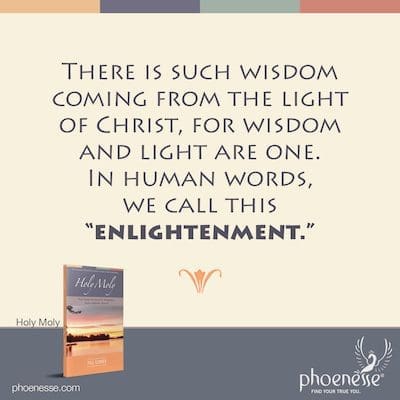What is the time of year that is most associated with ushering in Christ? For most of us, that would be Christmas. It is at that time of year when the light of Christ returns with renewed force in remembrance of the greatest deed accomplished on this planet, ever.
This light is so strong—so penetrating and so glorious—it creates rejoicing. There is such wisdom coming from this light. For wisdom and light are one. In human words, we call this “enlightenment.”

So during this time of Christmas, the light of Christ penetrates into the lowest spheres of doom and gloom—and to some degree, into the world of darkness. Maybe it’s just a glimmer, but it’s not nothing. And when beings in the world of darkness encounter it, they don’t like it—unless they are ready to advance spiritually, in which case they will welcome it. And follow it.
Those who are not that far along will find it very painful. As we grow and develop as spiritual beings and move into this human realm, and as we succeed in bringing out this light from within—and make no mistake, it is one and same light—we will have protection against creatures who still reside in the world of darkness.
So say again—who is this Christ? Some Christians claim that he is God. Not so. Jesus said so himself and you can read all about it in the Bible. He’s also not the Father, nor the Creator. Some say Jesus was just a wise man, a sage, a great teacher. Sure, he had great wisdom. But not so different from other great ones who have lived at other times, in other countries. Also not so.
Here’s the truth of the matter. Jesus, the man, was the incarnation of the Christ. And this spirit is the greatest of all created beings. He is God’s first creation and his substance is the same substance as God’s. Each one of us, in fact, possess some of this same substance. It is what is referred to as the Higher Self, or divine spark. This is what we are liberating when we do the gradual work of spiritual development. But none of us—no other being who has walked the Earth, in fact—has this Christ to the same degree that Jesus did. And that’s the big difference.

So often people have this inner reaction about Jesus that says, “What makes him so much better than me? That’s not fair.” Such thoughts and feelings lurk inside us. And therein lie the seeds of the Fall of the Angels.
This very thought was there well before the start of humankind, before the start of even this planet. And it is what caused disharmony and evil to come into existence.
Now, no one at the time thought very much of this. Certainly, we didn’t realize the danger or possible results that could come from harboring such an attitude. But right there, in the middle of that jealousy, lies a lack of faith in God and his capacity to love.
Because even though God made Jesus first, and gave most of his substance to him, if we have faith in our Creator, which God deserves, we would not think this was unjust, or that it somehow means we lack anything. Today, many of us are past feeling this way in any measurable way. But nevertheless, that little bit of resistance against Christ by a big number of people represents the germ from which all our evils have sprouted. And that’s what caused us all to fall.

So in what way then has Jesus Christ been the one to save humanity? What was this “greatest deed of all?” Why did he come here? Well, one reason, of course, is that he gave us a lot of very good teachings. But true and beautiful as they are, the same basic ideas could be found from other sources, in other ways. So that couldn’t have been the only reason he came.
The second purpose—but not yet the main one—was to show us how it could be done. If we look at his life and death symbolically, we can see the stages of development we each must go through to regain the Kingdom of Heaven. Just as for Jesus, there will be periods of tests, trials and faith needed in times of adversity, a crucifixion of the ego with its vanity and self-will. Indeed, it’s all there in the story of his life.
Then there’s the resurrection of his spirit that shows us that true happiness and eternal life can be found after the ego has been crucified. And that can’t happen any other way than by going through pain. But even this is not the main event. What was the real purpose for his coming?
Hang on—we’re going to get there. Because he was the Messiah, and he had a fabulously good reason. But first, know this: If Jesus had failed in his mission—and it was always a possibility that that could have happened—another spirit would have come. Jesus was the logical choice, and you’ll come to see why shortly, but in the end, someone had to do it. Someone had to take on the task of going through all that suffering—completely alone.
At times, he was even barred from having any divine protection, and needing to resist all evil and all temptation out of his own free will. Only in this way could spiritual laws not be broken. It is because of this very fact of the upholding of spiritual justice that every single one of us—including every single force of evil—can now find our way all the way back to God. And that means everything.
God, as we all know, is the power. And with his power, he could certainly have done anything, including breaking his own laws. But he didn’t. Because that would have meant that a whole heck of a lot of beings would have been stranded, unable to ever get back to bliss. That might have included any one of us. It is only through a very vast and elaborate plan called the Plan of Salvation that it is possible that every single created being—down to the vary last one of us fallen creatures—can sooner or later make the trek home to God.
Once you understand the Plan more fully, which we’ll get to in a minute, it will be impossible to say that God is unjust. No one will then be able to say that our gift of free will has ever been violated. But we must realize that the situation was extremely grave and serious. The daring solution that upheld supreme justice for us could only have happened if someone was able to fulfill an incredible task. Jesus Christ was the one to do it. If it hadn’t been him, could it have been you?
Return to Holy Moly Contents


